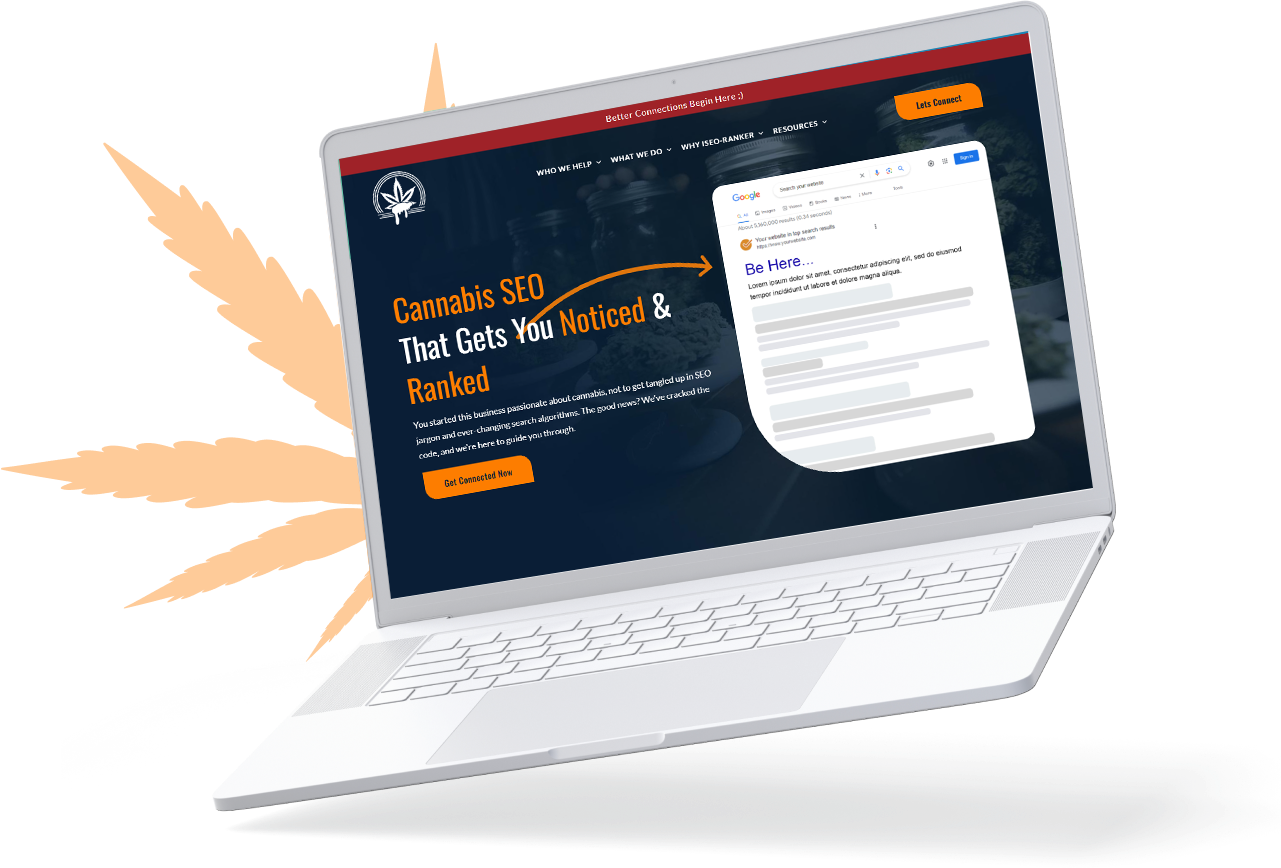SEO Migration
If you’re launching a website redesign, you need to consider migrating your SEO. Without SEO migration the typical website loses between 30-50% of their organic traffic – almost overnight. It’s much easier to retain rankings than get them back.
- Preservation of SEO Value
- Improved SEO Strategy
- Technical SEO Improvements
Book a free consultation with our national SEO experts today to pave your way toward online success.
Does a Dispensary Need SEO Migration?
Whether a dispensary needs an SEO migration depends on several factors. An SEO migration is typically considered when a website undergoes significant changes that could impact its search engine rankings and organic traffic. Here is a scenario where a dispensary might consider an SEO migration:
If your dispensary is planning a complete website redesign that involves changes to the site’s structure, URL structure, or content, it’s a good idea to consider an SEO migration. Without proper planning, a redesign can lead to a drop in search engine rankings and organic traffic.
Services
What Is Included In SEO Migration Services?

Technical Code Review
We’ll review your website code, making sure your website is running as quickly as possible and doesn’t contain elements that will negatively impact SEO.

Content Audit
Often removing valuable content is one the biggest reasons search rankings drop. We’ll determine valuable content that needs to stay and weak content that should be removed.

URL Structure Analysis
Poor URL structure can ruin the value of a page. Our team will make sure your URLs are optimized, include correct keywords, and that your folder structure is optimized.

Internal Linking Audit
An internal linking audit is a process of analyzing the internal links within a website. The way you link from one page to another within your site content and navigation plays a major impact on rankings.

301 Redirects Plan
A 301 redirect plan is a strategy for implementing 301 redirects on a website. This is a crucial tool in website management. Proper 301 redirects are essential to SEO migration success.

SEO Suggestions
We’re SEO experts and have lots of SEO strategy ideas. We’ll share these with you and can help implement strategies over the course of future months if needed.
Matters
Why SEO Migration Matters?
- Preservation of SEO Value
- Minimizing Traffic Loss
- Avoiding Duplicate Content Issues
- Optimizing for Mobile and Speed
- Preserving Backlinks and Authority
Preservation of SEO Value
When a website undergoes changes, there’s a risk of losing SEO value, including search engine rankings, organic traffic, and backlinks. SEO migration is essential for preserving this value and ensuring that the website maintains or improves its search visibility.
To avoid losing your authorship and page authority, try to keep your current content wherever possible. We know that you may want to create brand new content to align with your updated positioning or new brand name for your business.
Minimizing Traffic Loss
Without proper SEO migration, it’s common to experience a temporary dip in organic traffic during and after the changes are made. A well-executed migration minimizes traffic loss by redirecting users and search engine crawlers to the new, relevant pages.
Another important step to minimize the risk of losing traffic is reaching out to update backlinks. Make sure to contact the owners or managers of websites that link to your own and make sure their links to your site are updated.
Avoiding Duplicate Content Issues
During migrations, there’s a risk of creating duplicate content issues, which can harm SEO. Proper redirects and content consolidation help avoid this problem and ensure that search engines index the correct content.
Avoiding duplicate content starts focusing on creating unique quality content for your site; however, the practices to avoid the risk of others copying you can be more complex. The safest way to avoid duplicate content issues is to think carefully about site structure and focus your users and their journeys onsite.
Optimizing for Mobile and Speed
Many migrations involve improvements in mobile-friendliness and site speed, both of which are factors considered by search engines for rankings. SEO migration ensures that these improvements are leveraged to enhance SEO.
Mobile SEO is the process of optimizing your website to ensure that your site looks great and functions properly on mobile devices. When you perform mobile SEO, you’ll provide a positive site experience to users since it looks great on any device, regardless of the screen size.
"*" indicates required fields

Types
The Types of SEO Migration
01.
Domain Name Change
This involves changing the website’s domain name (e.g., from olddomain.com to newdomain.com). It’s crucial to implement 301 redirects to ensure that the old domain’s authority and SEO value are transferred to the new one.
02.
Website Redesign
A redesign involves making significant changes to the website’s layout, design, and sometimes content. It’s essential to update internal links, URLs, and meta tags to reflect the new structure and content.
03.
Platform Migration
When moving to a new content management system (CMS) or e-commerce platform, it’s vital to ensure that SEO elements are migrated correctly. This includes preserving URL structures, meta tags, and content.
04.
HTTP to HTTPS Transition
Changing from HTTP to HTTPS for secure browsing is important for both security and SEO. It involves obtaining an SSL certificate and ensuring that all internal and external links use HTTPS.
05.
Content Restructuring
When restructuring or consolidating content, 301 redirects are needed to direct users and search engines to the new URLs. This type of migration may also involve updating internal links.
What’s included in Website Migration SEO Services?
Our SEO website migration services identify the most important parts of your website and how SEO plays a role in your business success. This can vary from business to business. This clarity of user intent provides more data to use when conducting page optimization.
Develop a migration strategy several months before a new website to preserve existing and maximize future SEO performance. This includes navigation, internal linking, content strategies, and more. Keep as much of your current site’s authority as possible by mapping current content to its new page, keywords to their relevant pages, and redirects to nonexistent pages to enhance user experience and SEO.
Does Migrating a Website Affect SEO?
Firstly, the URL structure of the new website must be carefully planned to ensure that it maintains the same structure as the old website. Any changes to the URL structure can cause search engines to lose track of the pages on the website, leading to a significant drop in search engine rankings. It is important to set up proper redirects to ensure that users and search engines are redirected to the correct pages on the new website.
Secondly, the website’s content should be carefully reviewed and updated. For example, the content on the new website is significantly different from the old website, leading to a significant drop in search engine rankings. It is crucial to ensure the new website has the same content as the old website and that changes are made carefully. The website should be thoroughly tested before it is launched. This includes testing the website on different devices and browsers to ensure that it is accessible to all users, as well as trying the website’s load times to ensure that it loads quickly. A slow-loading website can negatively impact search engine rankings.
Get Ready to Grow Your Local Traffic?
Schedule a free consultation with a cannabis expert and we’ll tell you how we make your local business better.

FAQ
Frequently Asked Questions
When do I need to start the SEO migration process?
SEO must be considered throughout the process and will eliminate the need to rework layouts and coding. If you’re waiting until development is complete, we can provide your developers with a punch list of items to complete. Building and executing an effective website SEO migration strategy is a complicated endeavor. The earlier you begin planning, the more time to do it correctly.
What happens if I don't migrate my SEO elements?
Proper migration of all existing optimized elements from your old website is crucial for success. Otherwise, you’ll end up with a much less optimized site after launch than the previous website.
Without SEO migration, We’ve seen traffic drop anywhere from 30-90% – sometimes in just a few weeks. It then becomes an uphill battle to identify which elements weren’t migrated, move them over and then wait for the search engines to react. Often we find it can take up to 12 months for rankings to return, if not longer.
How long does SEO for site migration take?
The amount of SEO work and time required for a successful site migration depends on many variables, including:
- Existing organic value: If there is a lot to preserve, more resources are required to protect existing rankings and organic value. Consider SEO consulting services to determine your website’s existing organic value.
- Website size: How many pages do the old, and new websites have?
- Backlink profile: The size and complexity of your old website’s backlink profile will have SEO ramifications and can affect SEO strategy/resource allocation.
- Content additions: Does the new website have new pages, sections, or other optimizable resources?
- URLs: Will they be changing or staying the same?
- Dynamic optimizations: Does the website need to deploy dynamic tags for titles, meta descriptions, and other SEO elements?
How can I assess the impact of an SEO migration?
When migrating to a new website, it’s crucial to measure the impact the migration had on your website’s organic visibility. Always run a baseline keyword report so that you can compare future rankings to the old website. You can analyze your traffic by source/medium in Google Analytics and other software. You can set your source to “organic” and your medium to “google.” The most important SEO metrics to pay attention to following a site migration include:
- Organic keyword rankings
- Organic traffic
- Organic conversions (sales, leads, form completions)
Is it possible to migrate to a new platform without losing rankings?
Yes, it is possible to migrate to a new platform without losing search engine rankings. While there may be an initial decline in organic rankings and traffic while Google crawls your new website, with proper SEO planning, your website should end up ranking better in search engines.
Google does not want to punish a company for building a new and better website. But, if you create a worse website, especially from an SEO perspective, you will quickly lose organic rankings and traffic.
How can we retain all of our SEO links when doing a site migration?
When migrating to a new website, it is essential to automatically redirect any visitor who attempts to visit an old URL to a corresponding URL on the new website. Implementing 301 redirects will forward any traffic from old pages on your website to a related page on the new site. More importantly, 301 redirects help capture and preserve the “link juice” and authority from your previous site’s backlink profile. There are many different redirects, but a “301” redirect tells Google and other search engines that the URL change is permanent.



